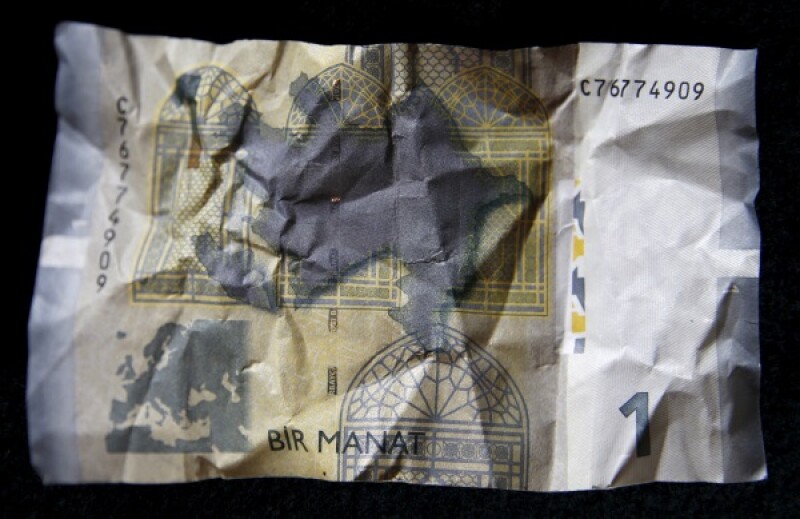
|
Azerbaijan's central bank was unable to offer indefinite support for the manat’s pegged dollar exchange rate, and cut the currency loose in December |
The downgrade, first by S&P in late January, and then by Moody’s last week, was not entirely surprising given the impact of the oil shock.
The sharp fall in the price of a commodity worth a third of Azerbaijan’s GDP, some two-thirds of government revenue and around 95% of its export earnings is causing concern for the government led by president Ilham Aliyev after years of trumpeting the nation’s rising oil-fuelled prosperity.
Unable to offer indefinite support for the manat’s pegged dollar exchange rate, the central bank cut the currency loose in December. As in Kazakhstan, considerable devaluation followed, which is now threatening inflation, recession and social instability.
Azerbaijan’s risk score of 45 points out of a possible 100 remained fairly stable throughout 2015, but its global ranking of 73rd from 186 sovereign issuers puts it in ECR’s tier-four category, commensurate with a B- to BB+ credit rating and contrasting with its across-the-board investment-grade ratings until Moody's and S&P opted for the downgrade.
Philipp Mayer, country risk analyst at Erste Bank, believes the downgrading is justified, stating: “Other oil producers/exporters will be similarly downgraded in 2016, although the relative starting position in terms of ratings is, of course, quite diverse.”
Several others agree, but Panayotis Gavras, head of policy and strategy at the Black Sea Trade and Investment Bank, is less convinced.
When looking strictly at creditworthiness, the external metrics are still robust, he claims. Despite the rundown in reserves, there is ample import cover. There are low levels of public and external debt, and a current account which is still in surplus.
“The economic downturn has caught everyone off-guard, but the devaluation has been mismanaged, causing panic,” says Gavras, who also believes that engaging with the IMF is more of an exercise in calming market nerves than a genuine need for financing, not least because the country has $35 billion-worth of buffer funds held in the State Oil Fund of Azerbaijan, the sovereign wealth fund.
All that being said, Azerbaijan’s downgrade did take place, it will raise the cost of borrowing, and is casting the net wider to consider the prospects for other oil-producing countries.
Worrying times in Astana
One is Kazakhstan, which is only one place higher than Azerbaijan in ECR’s global rankings, and is still considered investment grade despite a massive slowdown in real GDP growth to 1.5% in 2015, which could turn negative this year.
As with Azerbaijan, Kazakhstan’s economic risk-factor scores were all downgraded last year, and while some score higher than Azerbaijan’s, economic growth and public finances are questionable, alongside bank stability.
Some of the banks were forced to default in the wake of the 2008 global financial crisis, and prime minister Karim Massimov has indicated there is a growing need for the state to provide more local currency liquidity.
The combination of dwindling oil production due to ageing fields, ongoing delays to the Kashagan field and devaluation of the tenge is causing huge budget pressures, forcing up consumer prices as well as the costs of servicing dollar-denominated debts.
The possibility of government non-payment or non-repatriation has risen, the survey shows, contributing to a widening of credit default swap spreads since mid-2015.
Heating up in the Gulf
Meanwhile, Saudi Arabia has slipped five places in Eurmoney’s global rankings, and deeper into tier three to 39th, pointing to an A- rating at best, which is below the AA (negative) from Fitch, Aa3 (stable) from Moody’s and the A+ (negative) rating assigned by S&P.
Fellow Gulf hydrocarbon producers Qatar and the United Arab Emirates have slipped in the rankings too. Qatar is down two places to 20th, and the UAE by three to 28th, but both have substantial sovereign wealth funds to weather the storm and still appear correctly valued as AA rated credits.
Kuwait, though, is down four places in the rankings to 30th, and Oman, which has $20 billion worth of sovereign assets, is struggling to justify it’s A rating from Moody’s, having fallen three places in the global rankings into tier three.
The sultanate is planning to borrow as much as $10 billion to finance a budget deficit caused by the oil shock, including its first international bond issue in almost two decades, as falling oil revenue demands budget cuts.
Oil curse
Russia’s plight is now well-documented, but having shed almost 10 points from its ECR risk score during the past couple of years, with almost all of its risk factors downgraded heavily in 2015, the tier-four sovereign is no longer worthy of its remaining investment grade, Euromoney’s risk survey suggests.
Nigeria, meanwhile, is among several African borrowers struggling to maintain their credit ratings, with Fitch poised to lower its BB- negative rating in line with S&P’s B+.
Nigeria’s risk score remained fairly stable last year, but is down three points on a two- to three-year historical perspective, and like other regional oil producers – those not involved in a shared currency area – it has seen its currency stability score downgraded.
Angola’s currency risk score has plunged, alongside all of its other economic risk indicators. The country has careered down 15 places in the survey into tier five, and is now among the world’s worst default risks, making its B+ Fitch/S&P and Ba2 Moody’s ratings outdated.
Angola and Nigeria have recently entered into loan talks with the World Bank for emergency funding. Venezuela is already mired in tier five on the brink of default.
Unless oil prices recover soon, a raft of downgrades, and in certain cases selective defaults, are on the cards.
This article was originally published by ECR. To find out more, register for a free trial at Euromoney Country Risk.